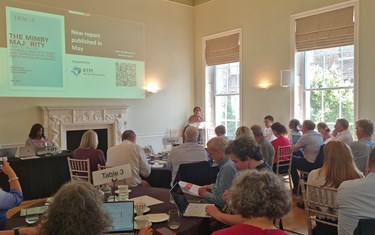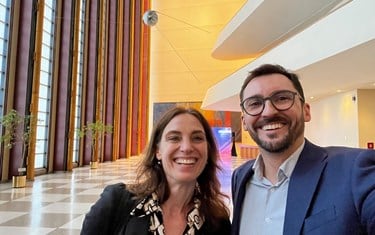 Jenny Divine is the RTPI's Research Officer
Jenny Divine is the RTPI's Research Officer
Life presents us all with ‘firsts’. The chance to experience something new. A ‘first’ that stands out in my mind is the time I jumped out of a plane for charity when I was 16. Excitement and anticipation (as well as utter dread) filled me as I took that leap of faith 15,000 feet above the ground. Faith, specifically, in the person who had packed my parachute!
Thankfully, my faith was not misplaced. I made it to the ground and have been able to experience many more ‘firsts’ over the years.
Including my most recent ‘first’ on 5 September. Although arguably not as risky as jumping out of a plane, I experienced similar feelings of excitement and anticipation as I embarked on a train to Manchester to attend the UK-Ireland Planning Research Conference for the first time!
The theme this year was “Planning in, and for, a Digital World”. Given that we’ve spent the last two years heavily reliant on the digital world for our shopping, our schooling, our working arrangements, and the majority of our social interactions, it was definitely an apt topic. But I was glad to be able to explore it beyond the glare of the computer screen, and back in the physical world at the University of Manchester.
From rewilding and wind farms to board games and virtual reality, the breadth of topics covered by the conference demonstrated planning’s great expanse. Encompassing the physical, social, cultural, economic, and technological, planning hooks into practically every aspect of our lives. And research is vital to enhancing planning’s impact on our lived experiences, whether these experiences be our first, second or fiftieth!
But how can planning research better influence planning policy and practice? This subject was explored in the RTPI’s roundtable on day 2 of the conference, “From Research to Practice and Back Again”.
Our Director of Education & Profession, Andrew Close, chaired the roundtable and was fortunate to be joined by a panel of planning academics: Olafiyin Taiwo, Cecilia Wong, Gavan Rafferty and Hannah Hickman. The discussion was vibrant, which demonstrates the strong appetite of planning researchers to disseminate their work beyond academia.
To do this, the panelists were clear that connections and good communication skills are vital. Connections not only help raise awareness of research within the wider planning profession and beyond, but also ensure that research is framed and explained in such a way that it has practical benefits and applications for practitioners and policymakers. Because, as the title of the roundtable suggests, knowledge transfer does not flow in just one direction. It is equally the responsibility of practitioners and policymakers to identify the knowledge they need and to seek it out as it is for academics to produce and convey this knowledge in a way that is meaningful and useful to the wider profession.
Joanna Averley demonstrated the importance of this during her keynote address on the final day of the conference. Having the attention of a room full of academics, she seized the opportunity to ask who in the room had expertise on a particular topic to help inform government policymaking into the future.
This opportunity for connection perfectly demonstrates Cecilia Wong’s point during the RTPI’s roundtable: that opportunities to share research can often be serendipitous. However, as Cecilia quite rightly pointed out, researchers “can’t wait for luck. We need to do things.”
But we mustn’t forget that things are already being done. Hannah pointed out the valuable research being undertaken by planning consultancies, such as David Lock Associates and Lichfields (the winning and commended entrants, respectively, of this year’s RTPI Awards for Research Excellence). Gavan noted the platform that KESS provides for Northern Ireland academics to present their research findings to politicians. Cecilia drew attention to the work of CAPE to improve university engagement with government and local and regional authorities.
However, we should not be complacent. The more connections we can create between academics and practitioners in both directions, the greater the potential for research to influence practice and vice versa.
The RTPI’s role in creating these connections is recognized in our recently published Research Strategy for 2022 - 2024. Specifically, we intend to promote the publication of research in our academic journal, Planning Theory & Practice. The Strategy also acknowledges the importance of research undertaken by accredited planning schools and we are currently formulating a dissemination programme to create additional linkages and increase the communication channels for their valuable work alongside that being undertaken by the Institute itself and by our members more widely.
I thoroughly enjoyed my first trip to the UK-Ireland Planning Research Conference. It was an incredibly rich experience. I would encourage all who are working in or have an interest in planning to attend in the future. I’m already looking forward to next year’s conference in Glasgow and hope to see you there.
The winners of the RTPI Awards for Research Excellence were announced at the UK-Ireland Planning Research Conference on 5 September. Many congratulations to all our winners!


